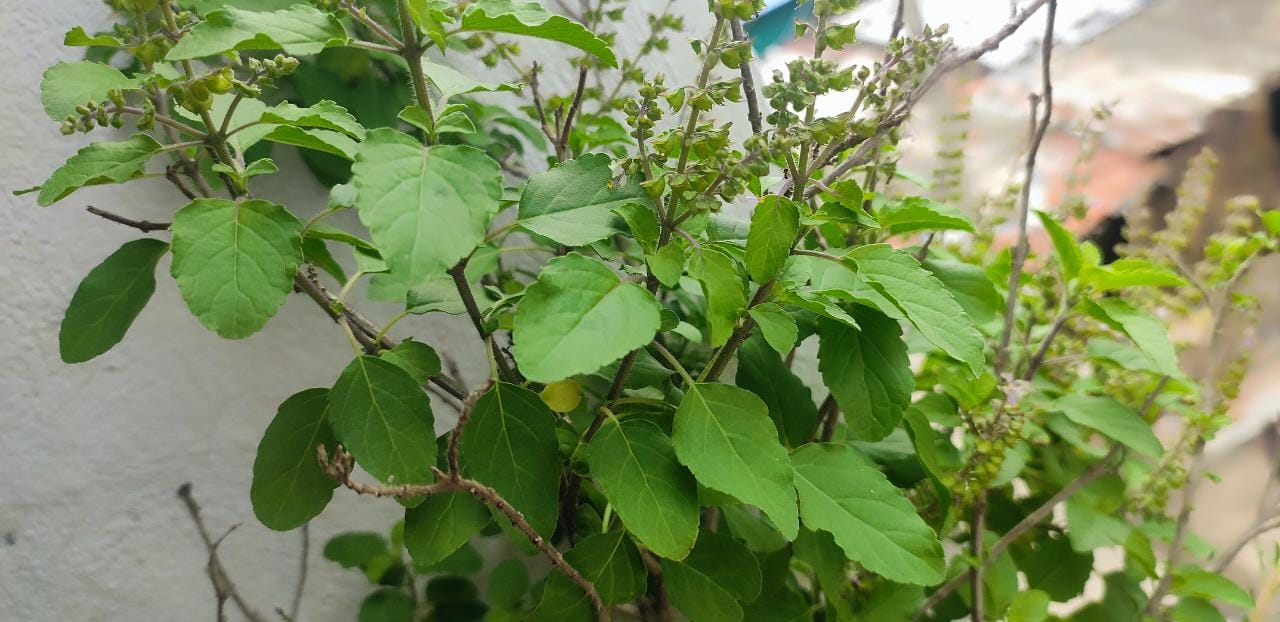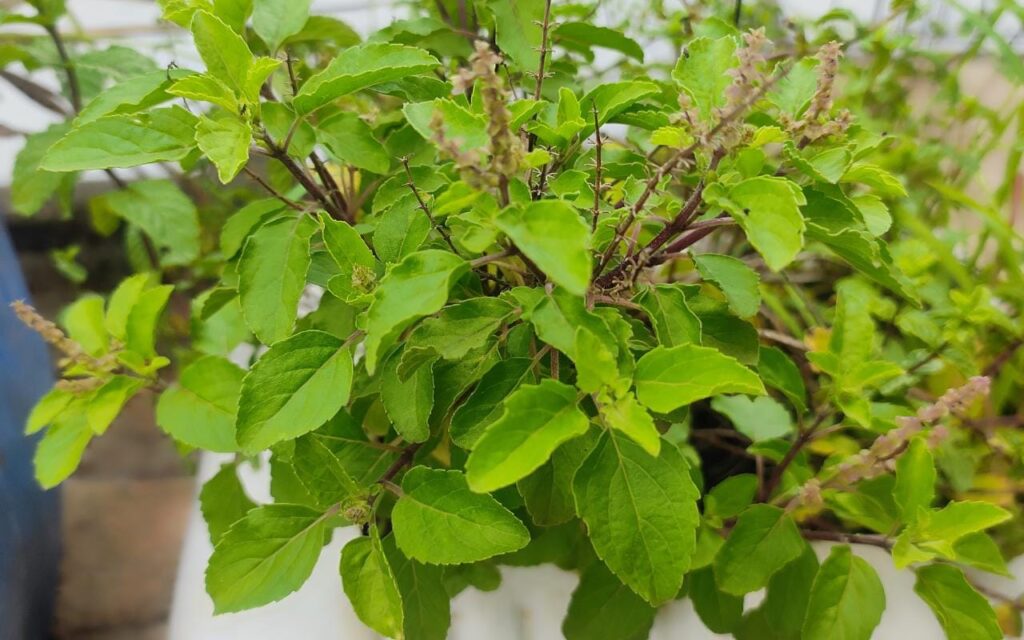Basil Leaves/Tulsi Leaves : A Traditional Remedy for Health and Well-being Tulsi
Basil leaves, commonly consumed raw in India, have long been recognized for their medicinal properties. In Indian traditions, basil holds a significant place as it is believed to have Vastu benefits. The plant is highly regarded and has been a part of every household.
Apart from its cultural and traditional significance, basil also offers various health benefits. The essential oil derived from basil is used in the cosmetic industry for making lotions, soaps, perfumes, and shampoos. Basil leaves contain essential vitamins like A, C, and K, as well as minerals such as calcium, iron, magnesium, and potassium. They are also a good source of protein and fiber, which are vital for maintaining good health. Tulsi leaves, as they are commonly known, have been used as a natural remedy for treating and preventing a wide range of diseases.
Scientific research has validated the health benefits of tulsi, making it the most significant herb in Ayurveda. Here are some unique health benefits associated with consuming basil leaves:
1) Stress Relief: Tulsi leaves possess adaptogenic properties that help combat stress and promote relaxation.
2) Immune Support: With its immunomodulatory effects, Tulsi enhances the immune system’s functioning and strengthens the body’s defense against infections.
3) Respiratory Health: Tulsi is known to have expectorant and antitussive properties, making it beneficial for respiratory ailments like coughs, colds, and asthma.
4) Anti-inflammatory Action: The phytochemicals in Tulsi leaves exhibit potent anti-inflammatory effects, reducing inflammation and associated symptoms.
5) Heart Health: Tulsi helps maintain healthy blood pressure levels and promotes cardiovascular well-being by reducing cholesterol and preventing plaque formation.
6) Digestive Aid: Tulsi leaves stimulate the digestive system, alleviating indigestion, bloating, and promoting healthy bowel movements.
7) Antimicrobial Properties: Tulsi exhibits antimicrobial activity against bacteria, viruses, and fungi, helping combat infections and boost overall health.
8) Oral Health: Chewing Tulsi leaves can improve oral hygiene by preventing tooth decay, bad breath, and gum diseases.
9) Anti-diabetic Effects: Tulsi has shown potential in managing diabetes by regulating blood sugar levels and improving insulin sensitivity.
10) Anticancer Potential: Several compounds in Tulsi possess anticancer properties, inhibiting the growth of cancer cells and protecting against oxidative damage.
11) Liver Protection: Tulsi helps detoxify the liver, supports its proper functioning, and protects against liver diseases.
12) Anti-anxiety and Antidepressant Effects: The anxiolytic and antidepressant properties of Tulsi leaves promote mental well-being and help manage anxiety and depression.
13) Neuroprotective Effects: Tulsi offers neuroprotective benefits, guarding against neurodegenerative disorders like Alzheimer’s and Parkinson’s disease.
14) Anti-aging Properties: Rich in antioxidants, Tulsi helps neutralize free radicals, reducing oxidative stress and slowing down the aging process.
15) Hormonal Balance: Tulsi leaves assist in maintaining hormonal equilibrium, providing relief from menstrual disorders and symptoms of menopause.
In terms of nutritional value, basil leaves are packed with vitamins, minerals, phytonutrients, protein, and carbohydrates. They are an excellent source of calcium, phosphorus, iron, zinc, and manganese. Additionally, basil leaves contain vitamins A, K, and C, as well as active substances like ursolic acid, linalool, carvacrol, rosmarinic acid, lutein, estragole, and zeaxanthin.
You can buy basil plant from click here
Tulsi, also known as Ocimum gratissimum or holy basil, is a herb with significant nutritional value. Here is a breakdown of its nutritional composition:
Energy: Tulsi leaves provide around 22.4 calories per 100 grams.
Carbohydrates: Tulsi leaves contain approximately 2.65 grams of carbohydrates per 100 grams.
Protein: Tulsi leaves are a good source of protein, providing about 3.15 grams per 100 grams.
Dietary Fiber: Tulsi leaves offer dietary fiber, with a content of around 1.6 grams per 100 grams.
Fat: Tulsi leaves have a low fat content, providing about 0.64 grams per 100 grams.
Water: Tulsi leaves have a high water content, contributing to about 92.06 grams per 100 grams.
Minerals: Tulsi leaves are rich in various minerals, including calcium (177 mg), iron (3.17 mg), potassium (295 mg), sodium (4 mg), phosphorus (56 mg), zinc (0.81 mg), and manganese (1.148 mg) per 100 grams.
Vitamins: Tulsi leaves contain several vitamins, such as β-carotene (3142 µg), thiamine (0.034 mg), niacin (0.902 mg), riboflavin (0.076 mg), pantothenic acid (0.209 mg), vitamin B6 (0.155 mg), choline (11.4 mg), vitamin C (18 mg), vitamin E (0.8 mg), and vitamin K (414.8 µg) per 100 grams.
These values may vary slightly depending on factors such as the variety of tulsi and its growing conditions. Tulsi leaves are highly nutritious and provide various essential vitamins, minerals, and other beneficial compounds that contribute to overall health and well-being.
- Fertility and Pregnancy: Consumption of basil leaves in large quantities may affect male fertility and, in extreme cases, lead to miscarriage. Pregnant women are advised to avoid tulsi consumption to be on the safe side.
- Liver Damage: Excessive consumption of basil, particularly the eugenol compound present in it, can harm the liver and lead to adverse symptoms.
- Blood Sugar Levels: Tulsi has the potential to lower blood sugar levels. Individuals on diabetes medication should be cautious as it can cause a drastic drop in blood sugar levels.
- Interaction with Blood-Thinning Medication: Basil has blood-thinning properties. If already taking blood-thinning medication, it is advisable to avoid consuming basil leaves.
- Nausea and Discomfort: Some individuals may experience temporary nausea when first consuming tulsi. Although long-term side effects are uncommon, caution is recommended.
- Tooth Enamel Damage: Chewing tulsi leaves can lead to tooth enamel damage due to the mercury content. Swallowing them whole is a safer option.
To consume basil leaves, one can enjoy tulsi tea, infused ghee or honey, tulsi juice, or simply add the leaves to regular tea. However, it is crucial to consult a doctor before incorporating tulsi or any other supplement into the diet, especially for lactating or pregnant women and individuals with pre-existing medical conditions.
In conclusion, basil leaves provide a natural remedy for various health issues and contribute to overall well-being. However, it is important to exercise caution, be aware of potential side effects, and seek medical advice when necessary. By harnessing the benefits of basil leaves, one can enhance their health and enjoy the traditional wisdom passed down through generations.

